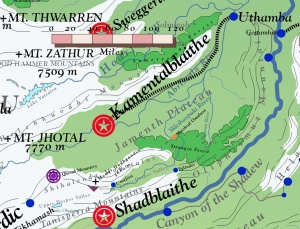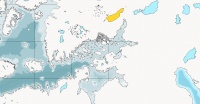Jamenth
Jamenth is a country in the southeastern high valleys of the Jaggudorns and was historically part of the New Kalikán Empire. The Valley of Jamenth comprises the Jamenth Plateau. Meltwater of the Jaggudorns creates three major rivers in Jamenth, the Abristalo River, the Skleihaspuki River, and the Igumit River which flow into the Shadew River. The Commonwealth of Jamenth comprises Jamenth and the Dospor Valley through which the Skleihaspuki River flows. Jamenth is walled to the north by the Helebhuodhi Mountains, to the south by the Shihalenda Mountains and the Tanisperra Mountains and the Olipheimuz Mountains. The largest forest in Jamenth is the Straugza Forest. The capital of the commonwealth is Kamentalblaithe. Jamenth borders Gantvia to the north, Shaddago to the south, Amandalia and Sardeichs to the west, and Hamalan to the east.

Jamenth has warm, somewhat humid summers with long, cold winters. Heavy snows are common, especially in the higher alpine valleys from midwinter to early spring. Gontha are the chief animal in traditional seasonal transhumance.
Commonwealth
Jamenth become independent from the Thracian Empire in 2576 through the Reduction of Thrace. Jamenth rests south of Gantvia and north of Shaddago. Jamenth has regular diplomatic relations with the Amandal Dwarves and the other Thwarrish states, including Thworgania, Dakkal, Thrace, Gantvia, Shaddago, and Ambracy.
Demographics
Jamenthines are principally of Gwenyan (Thwarrish) ancestry. A small but historically significant minority are of the High Shadevan Tribes and represent the indigenous, pre-Gwenyan peoples who are are classified as part of the Japhedune. Tolerated humanlikes include dwarves, the halflings of Tubbakese stock and Jaffgorn Giants. Trolls who don local dress and customs and have a human escort are sometimes tolerated. Gakhyami and Mountain Orcs will generally be attacked on sight. Elves are extremely rare and viewed with awe and some fear. Half-elves are tolerated. Half-Jaffgorn Giants (of part giant and part human heritage) constitute a significant minority and hold many of their own customs, divinities, and legends. They are viewed with suspicion but rarely open hostility.
Religion
Most Jamenthines hold some degree of observance of the Thwarrish Religion. Important divinities include Tuvar (Thwar), the River God Shadew, divinities of other major rivers (Abristalo, Skleihaspuki, Igumit), and ancestral divinities. Incarnandists comprise a very small minority of the population. Chaos cultists are rare.
Economy and Technology
Jamenth has dragonrail service and relies heavily on access to the Greater Pallathantic via the Grand Shadew Canal. The Shadew River is the main artery of transportation apart from the sky. Jamenth exports most of its grain and gontha stock. Tosplint Trees are cultivated along the Shadew River and through special farming techniques that use canals, farther from the river. The tree is essential for raising gontha, the chief livestock of the region. Cembar Trees are also cultivated for production of traditional skycraft which are used locally and sold abroad to wealthy enthusiasts. Other industries include traditional skycraft manufacturing, Aeolian Vapor, and mining. Minerals include tin, silver, and small gold mines. Placer mining for gold in the many rivers is common. Vineyards exist along the Shadew River where the unique micro-climate allows hardy strains of grapes to flourish through the warm season and survive the winter. The tea known as kawchi is imported to satisfy the population's consumer demand.
See Also
| This article is a stub. It requires further development by the creator. |
